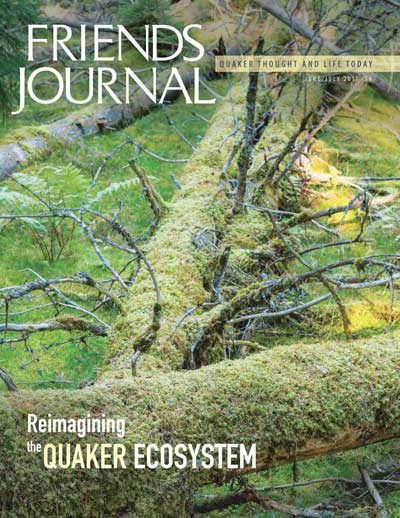
An Experiment with Online Programmed Meeting for Worship
I’m not quite sure when my fascination with religion began. I’m not even sure when I learned that there were other religions, but I do have early memories of going to meeting for worship at Stony Run Meeting in Baltimore, Maryland, and having to drive past the Cathedral of Mary Our Queen each and every Sunday.
They were next door to each other, and at some point, my First-day school class climbed the hill from our parking lot to the cathedral’s, and attended mass. I remember walking into the enormous gothic building and staring up at the extremely high ceiling. The paintings, the sculptures, the candles, the altar—each and every part of the church fascinated me. We sat quietly through the service and did not rise for communion, our First-day school teachers using that opportunity to describe to us how communion was different in our Quaker tradition. When the service was done, we tumbled back down that hill between our two parking lots and joined Quaker worship with our parents. Each Sunday thereafter, when the bells of the cathedral tolled 12, indicating the end of our worship, I would think about that church and how different it was from the simple, yellow walls and brown benches of our meetinghouse.
By the time I was in high school, my fascination with religion had led me to sing in a Baptist choir before Quaker meeting on Sundays, and attend Catholic mass at that same cathedral on Saturday nights. My time at Quaker summer camp and my attendance of Baltimore Yearly Meeting Quaker high school conferences had deepened my relationship with the tradition of waiting worship, but my thirst for more—more spirituality, more religious experience, more knowledge and understanding of religious tradition—wasn’t satisfied. An opportunity arose for me to attend Youth Quake, a national conference that no longer exists that brought together high school youth from different Quaker traditions. Encouraged by the adult leaders of my Quaker youth group, as well as my parents, my mom and I flew out to Seattle, Washington, to attend.
It was there that I experienced programmed Quaker worship for the first time. There was something in the heart of the scriptures that were read and the songs that were sung that made my body shiver. It was the same feeling when someone spoke in waiting worship and I knew that message had come from God. At Youth Quake I befriended some young people from Friendswood, Texas. They were politically and theologically different from me. I haven’t stayed in touch with them and don’t even know if they remember me. Yet this group of Friends introduced me to vocal prayer; in a time of personal difficulty, they prayed for me. I felt God’s presence in that prayer; I experienced that still, small voice in me connecting with everyone else. It was my first experience of communion.
From there, my journey took me many places to study religion in college and in graduate school. I studied Quaker faith and practice, Abrahamic traditions, Eastern religions, liberation theologies, Christian history, and spiritual formation. I’ve attended services at many different churches, synagogues, mosques, temples, and holy places. And more recently, I’ve trained as an interfaith hospital chaplain. As with most interfaith experiences, the more I’ve learned about other experiences and traditions, the more I’ve learned about myself. I’ve learned that while Quaker waiting worship is at the core of my faith and practice, unprogrammed Quaker worship does not completely satisfy my religious and spiritual hunger.
I also learned that for the first several generations of Friends, waiting worship was not the only time of spiritual focus during a Friend’s week. Friends read scripture; participated in Bible studies; and later on, influenced by the American revivalist movements, wrote and sang worship songs. In fact, the practice of preparing for worship was more than just being awake on Sunday morning; rather, it was an involved practice of integrating spiritual experience into every aspect of life.
Personally, I need more than an hour of waiting worship once a week. I’ve often supplemented Quaker worship with worship experiences of other traditions. While high liturgical services, Catholic mass, Gospel choirs, and contemplative practices have filled that need over the years, I’ve often wished that I could receive more from my Quaker tradition.
When I was a student at Earlham College and later at Earlham School of Religion, I was blessed to be able to attend First Friends Church in Richmond, Indiana, and experience programmed Quaker worship as part of a community. This has been the Quaker worship experience that has most holistically fed my spiritual needs and longing. Situated uniquely in the Quaker world at the crossroads of the liberal and programmed traditions, First Friends (now part of the New Association of Friends) offered scripture, song, a children’s message, and a sermon, in addition to waiting worship. The community was vibrant, involved in each other’s lives in healthy and positive ways, and intricately part of making worship whole on Sunday mornings.
When I moved to New England Yearly Meeting, I was hopeful to find other liberal programmed and semi-programmed meetings, but both geography and the situations of these meetings have prevented me from attending them. Indeed, the meetings themselves seem to be moving away from the programmed tradition: four out of the seven programmed meetings no longer have pastors.
Yet a hunger is emerging among Friends for creative, semi-programmed, full, and alive worship. There is an experimental semi-programmed worship group in the Boston area, and I hear from many Friends a longing to be part of a programmed or semi-programmed Quaker worship environment. More and more Friends I meet consider themselves multi-spiritual or bi-spiritual and seek to meet some of their spiritual needs in other traditions. Some are even afraid to offer vocal prayer or scripture in waiting worship, fearing that their ministry will be eldered as too programmed.
So several years ago in worship, the idea came to me to host an online programmed meeting for worship. There are several unprogrammed, waiting worship opportunities online, but to my knowledge, there are no other online programmed meetings for worship. I seasoned my leading to host an online programmed meeting for worship by talking with friends, praying, and bringing it to discernment circles. At first, it felt like a leading to supplement my Sunday waiting worship experience with scripture, song, and study. As months and years went by, I began to understand how an online programmed meeting for worship might serve the needs of others in the wider Quaker world.
Around the same time that I began publishing online programmed meeting for worship outlines, a dear friend of mine, Ashley Wilcox, started a mid-week in-person programmed meeting for worship in Atlanta, Georgia, with her friend Hannah Hill. This is a region that hasn’t historically had programmed meetings. Ashley and Hannah’s vision for this worship lifts up the voices of women and queer people, and provides an inclusive and radical place to unite Christianity and liberation theology. Their Facebook page reads that their church, the Church of Mary Magdalene, is “a place where women preach. It is a community where the voices of women, queer people, and others on the margins are centered.” They host semi-programmed Quaker worship on Wednesday nights at 7:00 p.m.
Since December of last year, I’ve written weekly posts with scripture, songs, a message, and a format for prayer and reflection. Forty-five to fifty people or more visit the site each week (“unique visitors” in tech speak). On average, my tweets about the worship are retweeted ten to fifteen times, and my posts on Facebook to various Quaker groups are reposted five to ten times. The unique online format of this programmed meeting for worship offers Friends an opportunity for programmed Quaker worship wherever they are, and is connecting Friends around the world.
From my limited data, I suspect that there are at least four different reasons people are reading or participating in the online programmed meeting for worship each week:
- The first group are those who are unable to go to Sunday worship. This group is perhaps the most obvious: Friends who use the online programmed meeting for worship as a substitute for going to worship in person. Some Friends live far from a Quaker meeting; some Friends have physical or medical limitations that prevent them going to meeting; some Friends work on Sundays as religious educators or in other professions; some Friends just moved to a particular area and haven’t connected with local Friends yet; and some Friends haven’t been to meeting in years but still want to stay connected with our faith tradition.
- Some Friends participate in the worship, or indeed just read the worship, as a preparation or supplement to their Sunday worship experience. Different elements offered speak to different people at different times. One participant wrote in a comment: “Perhaps it would help me to open myself to the song selections as I do to messages in meeting for worship: listen, feel with the messenger, then tune out the spoken words if they are not for me.”
- Some Friends long for connection with liturgical traditions and/or work in ecumenical settings where knowledge of the weekly scripture, as outlined by the Revised Common Lectionary, would be helpful. Connecting liturgical tradition to the Quaker experience helps Friends interact with other Christian communities as authentic and informed members of our own faith.
- A few of my friends who are Friends pastors and others who are preachers of other faith traditions have found the worship outlines helpful for settling into a place of contemplative worship as they prepare their own sermons. In this way, both the faith and practice of Friends has something to offer our own tradition as well as the wider religious world.
My own process in putting these worship outlines and messages together each week is grounded in worship. I often write them when my son is napping, settling into waiting worship and prayer. I then read the scripture chosen for the week as well as newsletters, emails, posts, and blogs that I’ve collected. Finally, before I begin to write, I consider the books on theology and history I have on my shelf and surround myself with voices of others. Then, as the writing unfolds, I weave together the insights on these different sources and the stories of my own life. I pause before again diving deep into that place of worship and asking God what message should emerge. Sometimes I get stuck, and I wonder if God wants me to stop writing mid-sentence. Other times the lyrics of a particular song will arise from that place of worship, and listening to it over and over unlocks another place in the soul. And as I write, I ask myself if the messages that are rising are for me or for others. I know that sometimes what comes out on the page are messages for me, but I hope that I am being faithful in my discernment of messages that are for others, too.
I have felt blessed by the comments and feedback that I have received so far from this ministry. I intend to continue the weekly posts and hope that this worshiping community will grow. I am excited to see what God has in store by bringing together Friends and seekers from around the world in this way. I am also discerning how and when to take the next steps. One possibility is to host a live programmed worship time online. I’ve also been inspired by the mid-week programmed and semi-programmed meetings for worship that are emerging, and I am discerning whether I am led to start one myself. I am bringing these ideas and questions of accountability, partnership, and support to my support committee, and expect that there is time needed to fully discern the next steps.




Thank you
I am a Christian “Convinced” Friend and need like minded spirits to connect with always. Now, with the Covid-19 problem, there are millions of aging baby boomers who have health conditions that are side-lining us for a while and we need the opportunity to reach out and help others as well as get some spiritual support as well. I am grateful you have started this effort to help all of us connect. Blessings !